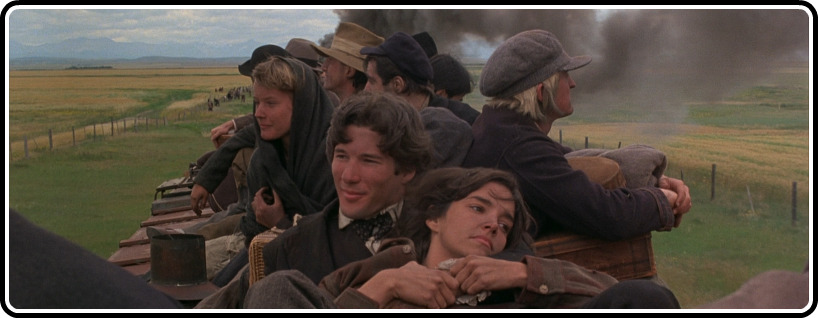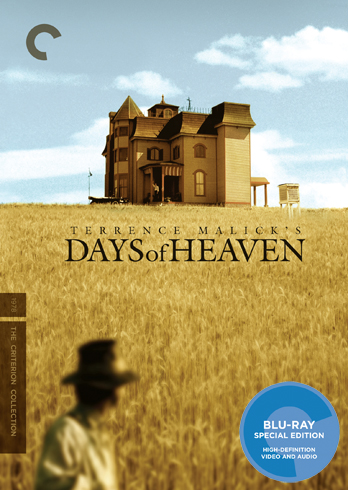My brother used to tell everyone they were brother and sister…
Terrence Malick. The man, the myth, the legend? In some circles he is considered a filmmaking god. In others, they wonder why it takes him so very long to make another film. To those latter people, I remind them of Stanley Kubrick. A perfectionist artist will always take a long time, and in the case of Days of Heaven, it only took him 5 years after the wonderfully grim Badlands. They didn’t know how good they had it back then, because it took another 20 years until he made The Thin Red Line (coming soon to the Criterion Collection).
But I digress. This is a review of the wonderful 1978 film Days of Heaven, a film in which I’d have to say is one of the most stunning and beautiful films I’ve had the good fortune to lay upon my eyes. A master at his work (and it was only his third feature), every shot has a purpose, every shot is a work of art and I don’t use the word ‘art’ very lightly. The film takes place in the years leading up to World War I, outside of Chicago where Bill (Richard Gere) gets into a fight with his boss at the stell mill and accidentally kills him. This of course freaks him out and he takes his lover Abby (Brooke Adams) and his little sister Linda (Linda Manz) and is on the run to Texas where the harvest is going on, therefore making it easier to get jobs.
They land jobs at a rich yet shy rancher (Sam Shepard) and pretend to be brother and sister because the farmer has taken a shine to Abby. The farmer is young yet is dying of an undisclosed condition and doesn’t want to die alone. He wants to marry her and Bill convinces Abby to go along with it and when he dies they can collect on the inheritance. But of course things don’t always go to plan, the farmer doesn’t die in the fast fashion that Bill wishes, Abby starts to fall in love with the farmer, a farmhand (Robert Wilke) suspects something is not what it seems and it’s all boiling down to a confrontation we know is coming but are afraid to know what the consequences will be when it does come about.
The film is told in a different sort of way, because from a viewer’s standpoint the main character would either be Bill or Abby. But amongst all the scenes played between them, between even the farmer and Abby (their love growing) and Bill (the hatred and suspicion building), we have a central voice coming from young Linda, who hauntingly recalls all that has occurred via a narration that I can’t get out of my head. It’s almost as if she’s telling someone this tale many years later, a therapist perhaps? But we get the idea that she has seen horrible things in her life up until that point and that nothing probably would surprise her, so all the events that take place within this film are just a snapshot of the usual fare for her.
Malick takes his time with his films, making only four feature length films in four decades. It’s only fitting his newest, Tree of Life, is in the start of the fifth decade (sixth if you count his first short film) but an artist can’t be rushed. You can tell from this film that Malick isn’t doing a usual dramatic film. The pieces are all there, of course, but he’s telling a story of ultimate loss and showcases it in such beautiful shots of the Texas prairie. The film is also accompanied by a wonderful score by Ennio Morricone. No surprise there, but the lush sounds and the scope of which they are presented makes it a sought after score that most people when hearing it just soak it up and experience it rather than just listening to it.
The Criterion Collection puts out an amazing Blu-ray edition of Days of Heaven, deservedly so and places it in its rightful place in film history as an important part of 70’s filmmaking, further proving why the 70’s were the most diverse and risk taking decade for film. We get a stunning transfer approved by Malick himself, as well as editor Billy Weber and camera operator John Bailey. A very detailed commentary featuring Weber, art director Jack Fisk, costume designer Patricia Norris and casting director Dianne Crittenden. We also get an audio interview with Richard Gere, video interviews with Bailey, cinematographer Haskell Wexler, and actor Sam Shepard, as well as a booklet with an essay by critic Adrian Martin and a chapter from the autobiography of Nestor Almendros, the director of photography.
It’s a great starting point for anyone looking to get into Terrence Malick and it’s frightening to know that you only have to find three more films to complete his filmography. In a few weeks we’ll have The Thin Red Line within the Criterion Collection and hopefully this paves the way for his fictional retelling of the Starkweather murder spree in Badlands in the coming years. I tend to be a completist with certain filmmakers and Malick is one filmmaker that anyone who lives and breathes films needs to have on their shelves and in their Blu-ray players.






I haven’t seen the Blu-ray copy, but the DVD is one of my favourite Criterion disks not to mention maybe my favourite film. I would really love to see Badlands on the Criterion collection as the dvd for that isn’t very good.
I owned both the DVD and Bluray and I will say that the Bluray is definitely a noticeable upgrade, even though the DVD looks beautiful on my 46″ HDTV. I sold the DVD to a friend though, once I saw the Blu, I figured I had no reason to settle for watching the DVD anymore! We should put an article together comparing DVD and Bluray versions to let people who own the DVD get a sense of how much of an improvement they’d notice thru the upgrade…
Nice to see people other than me writing about Criterion “old releases” here! :o) Good job James!
I owned both the DVD and Bluray and I will say that the Bluray is definitely a noticeable upgrade, even though the DVD looks beautiful on my 46″ HDTV. I sold the DVD to a friend though, once I saw the Blu, I figured I had no reason to settle for watching the DVD anymore! We should put an article together comparing DVD and Bluray versions to let people who own the DVD get a sense of how much of an improvement they’d notice thru the upgrade…
Nice to see people other than me writing about Criterion “old releases” here! :o) Good job James!
Good to see an enthusiatic review for such a mesmerizing film, as all of Malick’s film seem to be. Malick’s romance with enviroments is simply breathtaking, and his three flora and fauna films: Days of Heaven, Thin Red Line, and The New World are testaments to his unique gift for seeing the interconnectivity of all things. I can’t wait for “Tree of Life”..